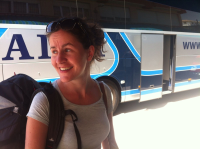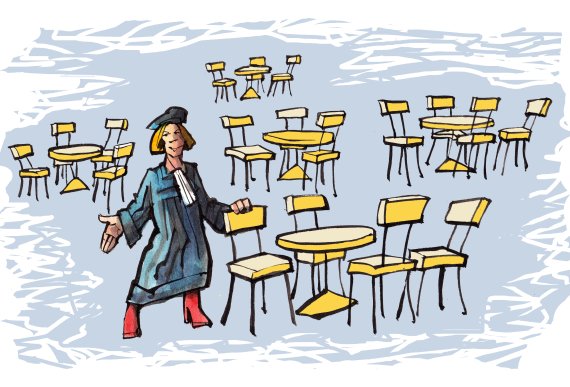Illustration: Henk van Ruitenbeek

Anne van den Berg, Msc STUDENT OF Development and Rural Innovation
‘With the growth of the WUR and the passing of time, change is inevitable; and I think innovation is rightly part of that. But in the process you should keep an eye on the core values of your organization. Group work contributes to your personal development, but only up to a point. I think we have reached the limit, at least for the courses I took in the past year. More group work can detract from the small-scale feel of the programme, which is one of the WUR core values that students consciously opt for. What is more, group work is not necessarily representative of a work situation. Friction between students arises more easily because one member of the group is aiming for a 9 while another is satisfied with a 6. In a workplace people’s goals are more aligned.’

Iris van Marwijk, MSC STUDENT OF Molecular Life sciences
‘I am working now on my second MSc thesis and taking part in a thesis circle for the first time. The idea is that in a group of students supervised by a faculty member, you evaluate each other’s presentation, research proposal or report. I think a thesis circle makes a positive contribution to the process of writing a thesis. You get feedback from your fellow students, it provides some pressure to finish a piece of writing faster so you can share it, you learn to look at your own and other people’s work critically and to give and receive feedback. Because you are with students from other degree programmes or years, it also helps you broaden your perspective and learn from each other.’

Anne Walther, Bsc student of Molecular Life sciences
‘Educational innovation is good because innovation means you might improve a situation. But in the case of WUR it is questionable whether these are innovations or emergency measures to cope with the pressure. Preventing a situation from getting worse is not innovation. Take the thesis circle. I can’t do anything with two lines of feedback on 20 pages. If the teacher isn’t really involved, you are not sure about the quality of the feedback, whereas the idea is that you learn from it. I also have my doubts about the digitalization of things like practicals. Sounds nice enough but it does mean less hands-on experience. And that was precisely one of WUR’s strong points.’

Pelin Karsili, MSc student of Biotechnology
‘In one of the courses I have followed during my MSc, most of the lectures were replaced by self-study. Every week there would be active discussion sessions about the topics instead of passively attending the lectures. I think that was a good initiative. With traditional lectures you easily lose attention and a more active approach allows you to learn faster. But I do think we needed some time to get used to it. It would have been different if we had more courses taught that way. I think this is normal with innovations: you need time to adapt before you know if it works.’

Lennart Jongen, Msc student of Earth and Environment
‘I found the thesis circle a helpful addition to the process of writing my MSc thesis. It did take some time but I certainly got some improvements out of it both for the content and the writing in my thesis. The disadvantage of a thesis circle is that the quality of it depends heavily on students’ motivation. If there are a couple of students who can’t be bothered, it won’t work. There were big differences between the students in my thesis circle. It is also important that there is a teacher at the discussions, to keep up standards. Then it is a valuable bit of educational innovation which is not just efficient but also contributes to raising the quality of the thesis.’

Bart Vlemmix, Bsc student of soil, water and atmosphere
‘In several computer practicals I worked with dummy data, which didn’t come from actual measurements. That doesn’t really bother me. I only had instruction films on one course. The information in that kind of film must be simple and clear, because if you still have to ask questions about it in class, it defeats the object. I wonder a bit whether these kinds of methods can really solve the capacity problems, but I would want to assess that for the whole programme and not per course. So as a first-year I feel too inexperienced to really be able to say anything about it.’

**Ivo van Gerwen, Bsc student of Business and Consumer Sciences
‘On my programme there is a lot of group work, which I find useful for polishing the skills needed to function in a group. Through consultations you often discover new things, which you wouldn’t have come up with on your own. But sometimes the groups are too big, I feel. Three to four people should be the maximum. With a group that size, even with the division of tasks, you can all be actively involved in everything. And then, there is a lack of an individual essay moment in the Bachelor’s. It would be nice if you could already develop some writing skills before you start on your thesis. A combination of individual essays and small group essays would work best for me, for gaining the most subject knowledge and learning to work better in a group.’

